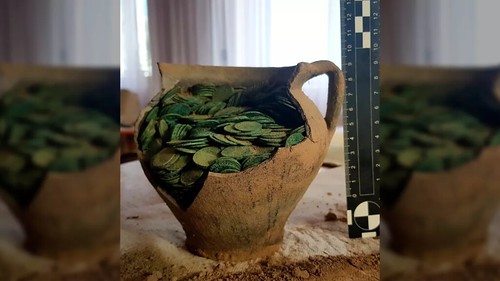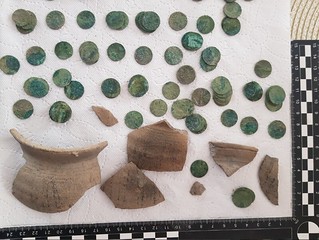
PREV ARTICLE
NEXT ARTICLE
FULL ISSUE
PREV FULL ISSUE
17TH-CENTURY COIN HOARD FOUND IN POLANDArthur Shippee also passed along this story of the discovery of a hoard of 17th-century Polish and Lithuanian copper coins. Thanks. -Editor A metal detectorist searching for discarded tractor parts on a Polish farm discovered a completely different type of valuable metal: A spectacular hoard of 17th-century coins buried beneath the soil. The hoard — a vast stash of about 1,000 copper coins — was found in late February near the small village of Zaniówka in eastern Poland, near the borders with Belarus and Ukraine, by a local man, Michal Lotys. Lotys was using a new metal detector to find spare parts for his sister's tractor; and so when the instrument started beeping in one of the farm's fields, he scraped away a layer of the topsoil. That revealed the coins spilling out of a broken clay "siwak" — a jug in a local style with one handle and a narrow neck. Using a metal detector to search for buried relics without a permit is illegal in Poland, and so Lotys contacted archaeologists in the nearby city of Lublin, about 95 miles (150 kilometers) southeast of Warsaw, who visited the farm the next day. Their investigations showed that the location of the hidden hoard was clearly outlined on the surface of the soil, which indicated it had been buried there intentionally, according to a report in the Polish news outlet The First News. Dariusz Kopciowski, the director of Lublin's heritage conservation agency, announced in a Facebook post on March 2 that the hoard has about 1,000 Polish and Lithuanian copper coins minted in the 17th century.
Investigations show most of the coins were created between 1663 and 1666 in mints in Warsaw; Vilnius in Lithuania; and Brest, which is now in Belarus but was then part of the Polish-Lithuanian Commonwealth.
To read the complete article, see:
THE BOOK BAZARREWayne Homren, Editor The Numismatic Bibliomania Society is a non-profit organization promoting numismatic literature. See our web site at coinbooks.org. To submit items for publication in The E-Sylum, write to the Editor at this address: whomren@gmail.com To subscribe go to: https://my.binhost.com/lists/listinfo/esylum All Rights Reserved. NBS Home Page Contact the NBS webmaster 
|

